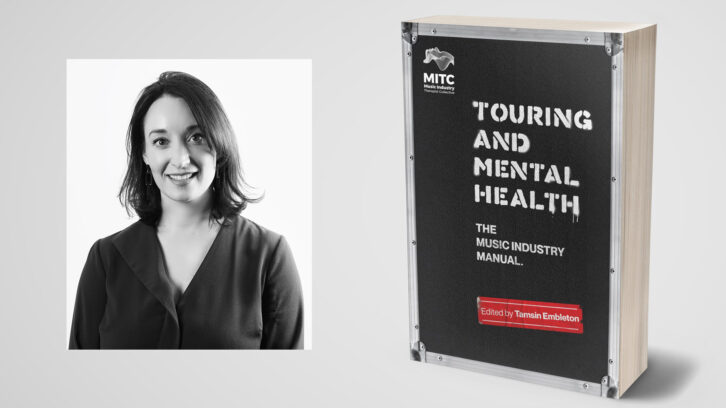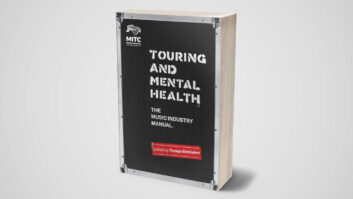
New York, NY (March 23, 2023)—2022 was massive for the touring industry as artists and production pros powered through the first full concert season since the peak of the pandemic. While there were record ticket sales and audiences were thrilled to hear live music again, there was also hardcore stress and anxiety for crews due to COVID concerns, crazy schedules and many professionals simply not being emotionally ready to return to the road. While some artists canceled entire tours citing their mental health as the cause, production personnel were rarely able to step away for the same reason, even if they knew they had a problem.
However, recognizing potential mental health issues, their causes and most importantly, ways to overcome them can make production pros’ time on the road less difficult and more rewarding. With that in mind, psychotherapist Tamsin Embleton’s new book, Touring and Mental Health: The Music Industry Manual, (Omnibus Press; $56) hits bookstore shelves today, advising how professionals can best help themselves and fellow crewmembers [For insight on helping other touring pros, scroll down to Sidebar: Lending A Hand…].
The world of live music is one Embleton knows well, having spent 10 years as a venue, festival and event booker, artist manager and tour manager. “I was on the road in Europe in 2010 when I first figured out that being a therapist in the music industry might be a job I could pursue,” she says. “I was at a post-show dinner with Anna Calvi, Nick Cave and their respective band members—we were on the road with Grinderman—and Nick and I were sharing therapy stories.”
Now a degreed and registered therapist, Embleton began researching the psychological impact of touring in 2016. At the time, there were multiple studies covering musicians’ mental health, but few explored why so many artists and production staffers suffer ill health as a result of touring. Recognizing a need for insider advice, she began writing a manual that would address the issue head-on.
PLASA Report: Live Sound Bounces Back, But Challenges Remain
Six years later, Live Nation is involved in the book as a sponsor (though it had no editorial input) and more than 80 high-profile musicians and veteran tour personnel have shared their insights and recollections for the tome, including Event Safety Alliance co-founder Jim Digby; tour managers Trevor Williams and Angie Warner; and production managers Jake Berry and Dale ‘Opie’ Skjerseth.
Artists also share their hard-earned knowledge in the book, including Nile Rodgers, Justin Hawkins (The Darkness), Philip Selway (Radiohead), Katie Melua, Kieran Hebden (Four Tet), Will Young, Taylor Hanson (Hanson), Lauren Mayberry (Chvrches) and Pharoahe Monch; and many more.
“It was great to speak with Marty Hom [tour manager for Barbra Streisand, Fleetwood Mac and others] who gave some brilliant examples of high-stress, high-risk situations he had navigated on the road,” said Embleton. “I could talk to Tina Farris [tour manager for The Roots, Chris Rock, Nicki Minaj and others] literally all day; she had a lot to share and was really open about what she’d learnt being a Black woman in a position of power on the road.”
The touring world is all about networking, so touring pros that Embleton interviewed often connected her to other top names in their fields. The result is 640 pages of insight and advice shared by peers and mentors. Designed to help both longtime pros and those new to the field, it’s safe to say copies of Touring and Mental Health: The Music Industry Manual will get passed around tour buses and vans this summer, and probably start some frank conversations as well.
•. •. •. •. •
SIDEBAR: LENDING A HAND…
We asked psychotherapist Tamsin Embleton what production pros can do when they see peers having a hard time on the road:
“Talk to the person you think might be struggling. Find a confidential space and name what you’ve noticed—a behavioral change, withdrawal, whether they seem low or anxious, perhaps they’re not hanging out in the back lounge anymore, maybe they’re drinking or taking more substances, they’re irritable, angry, etcetera.
“Listen very carefully to what they say is going on for them. Don’t try to disprove it or hijack it with your own experiences. Just listen and empathize. Sometimes listening is enough to alleviate a burden; other times, they might need to adjust something about the way that they’re working or speak to a professional. Think together about what they need and what would help in the short and long term. If they would prefer to work with someone in the music business, organizations like the Music Industry Therapist Collective can pair you with a specialist. The book’s ‘Mental Health Conversations and Crisis Management’ chapter by Whitney O’Malley, a psychotherapist who worked at record labels and with Linkin Park, advises what to do if someone is in crisis—a panic attack, overdose, psychotic episode, manic episode, self-harming, suicidality—and shares how to conduct conversations about mental ill health.
“More broadly, employers can prioritize rest and sleep; offer greater job security; start to shift the culture around excess on the road; reward good health behaviors; provide ‘dry’ dressing rooms and decent alcohol-free beverages; and set time aside to contact family. We are relational creatures—we need meaningful contact to feel safe and whole. Touring can make establishing and maintaining relationships really difficult, which can be destabilizing in and of itself, so there is a whole section in the book dedicated to addressing relationship challenges both on and off the road.”







